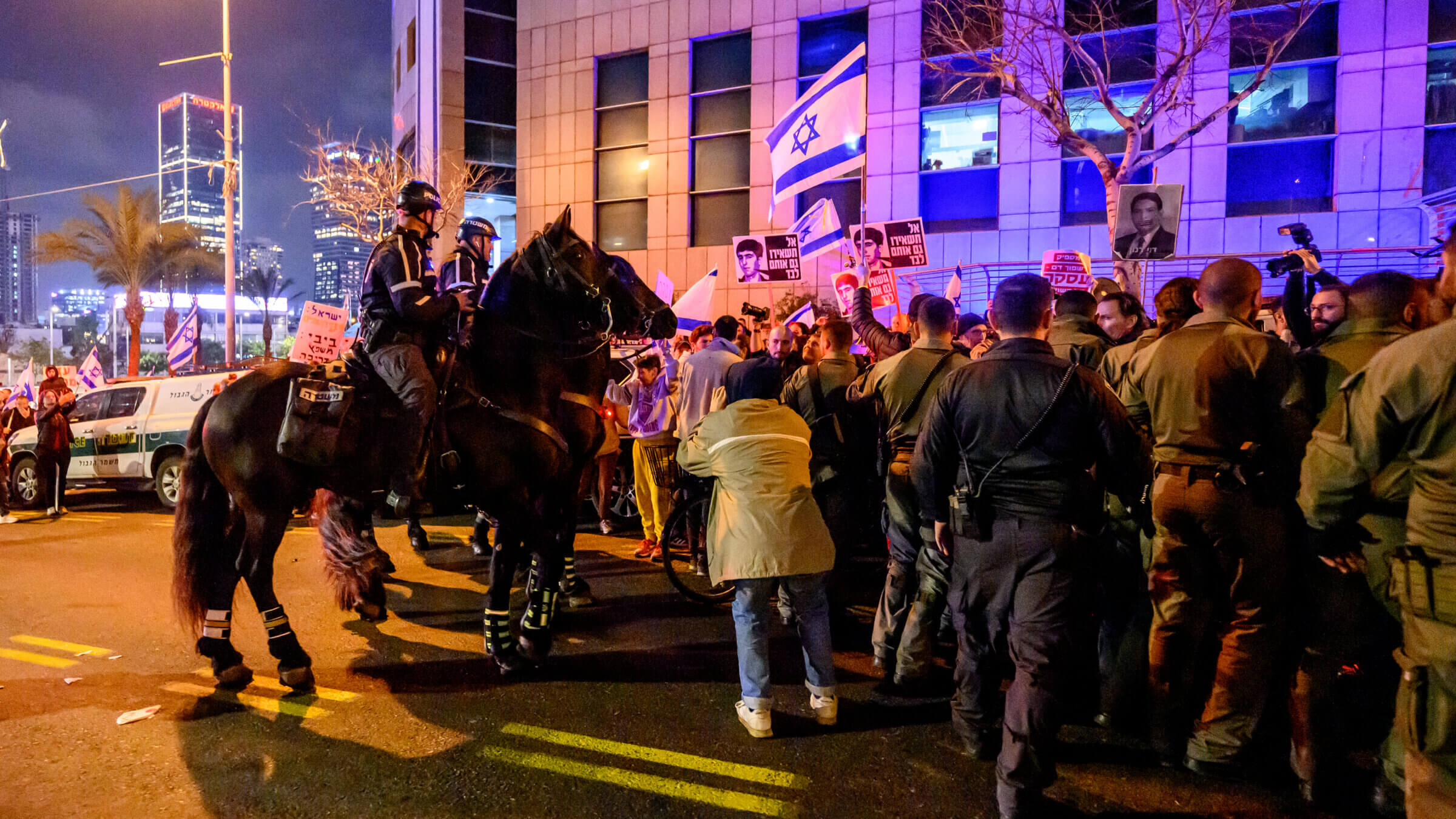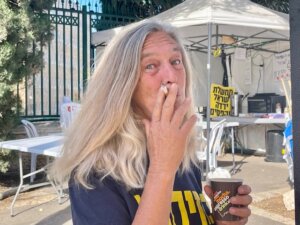At 2 a.m., Israeli protesters share bottles of wine, grief about Oct. 7 and fury at their government
Inside the tent city where a handful of hardcore activists have been living for months

Police on horseback engage protesters on Kaplan Street Feb. 24. Photo by Roy Rochlin/Getty Images
JERUSALEM — Lea Nachimov, a goat farmer from the Negev, spent her first night camping outside Israel’s Knesset in early November. She and other activists, including relatives of people murdered on Oct. 7, have spent the months since calling for Prime Minister Benjamin Netanyahu to step down and a deal to free all the hostages.

Nachimov, who is 61, said she figured she’d ask her friends to join her for a second night of protest, and they’d ask their friends, and so on until hundreds of thousands of Israelis — millions, maybe — would form a tent city around the building that would be impossible for lawmakers to ignore. She imagined the hostages would be freed by December, the government toppled by early January and she could pack up her sleeping bag and head home by the rainy season.
“It seemed possible because of the magnitude of the crisis,” she told me, sipping wine at 2 a.m. Wednesday outside that same tent where she has been sleeping for five months now.
“But everybody was too in shock, too much in mourning, too afraid to criticize the government during wartime,” she added. “So pretty much nobody showed up, and that depressed me.”
Nachimov’s mood has been buoyed somewhat in recent weeks as more Israelis have been turning out for anti-government protests here in Jerusalem and elsewhere throughout Israel. Those protests come as Netanyahu’s favorability is falling among Israeli voters and international allies, including the United States.
On Sunday, a sea of 100,000 protesters packed Jerusalem’s Kaplan Street between the Knesset and the Foreign Ministry building, making headlines around the globe. It was reminiscent of the pre-Oct. 7 mass Saturday night protests against Netanyahu’s proposed overhaul of the Israeli judicial system.
“It’s like the band is back together,” Erv Horvitz, a retired teacher, told me during Sunday’s march.
Most in Sunday’s crowd headed home that night. But about 150 stayed for a four-day sleepover vigil that ended Wednesday morning, pitching their tents near the one in which Nachimov and about 15 other hardcore activists have been sleeping on Kaplan Street. The newcomers also set up a mess tent, a tent for physical and emotional first aid, a few for lectures and group discussions, one for extra camping equipment, charging stations and even a sink where protesters could brush their teeth.
Volunteer security crews were posted at each end of the street. This winter, someone set fire to the main tent, and, on another occasion, slashed it with a knife.
Late Tuesday night, several activists left Kaplan Street to demonstrate outside Netanyahu’s home about a mile away, and returned to the encampment reeking of the skunk water police had sprayed on the crowd to disperse it. The stench — evoking a mix of rotten meat and feces — permeated the compound, yet clusters of activists, seemingly unbothered, sat together well into the wee hours, sharing bottles of wine; grief about the Oct. 7 dead, wounded and kidnapped; and fury at their government.
Many said they think Netanyahu is prolonging the fighting in Gaza in order to avoid elections that polls show would end his tenure as Israel’s longest-serving leader. And that he seems to care more about that than about securing the release of the 134 hostages remaining in Gaza, several dozen of whom are believed dead.
(This was hours before Benny Gantz, who joined Netanyahu’s coalition from the opposition after Oct. 7 and is a member of the war cabinet, called Wednesday for new elections in September.)
Several of the protesters used the word genocide to describe Israel’s war policy, and likened Israel’s increasingly restrictive policies on policing and press freedom to those of a fascist state.
Nachimov and others in the tent city told me they found kinship in these late-night talks and knowing they are not alone in their frustration.
“You find beauty on the streets, especially at night,” she said.
Around 2 a.m., a Haredi teenager wandered by to wish us laila tov — good night.
Nachimov, who told me she has returned home about once a week since November, said such yeshiva students often stop by seeking to learn more about protesters’ perspectives, and seem genuinely mystified why adults would voluntarily camp out on streets reeking of skunk water if they’re not getting paid for it.
She also was dismayed that they were among the only young people on Kaplan Street, and that she had not been joined by her five adult sons, though she sees the protest as “fighting for their future.”
“I’m one of the youngest ones here,” Nachimov said before turning in for the night.
She emerged from her tent several hours later once the sun had risen. As more Israelis were joining the cause, she had decided her own perma-protest would come to an end. She would pack up her things and head home.
“I’ll come back to visit,” she said. “But this can go on without me.”






















